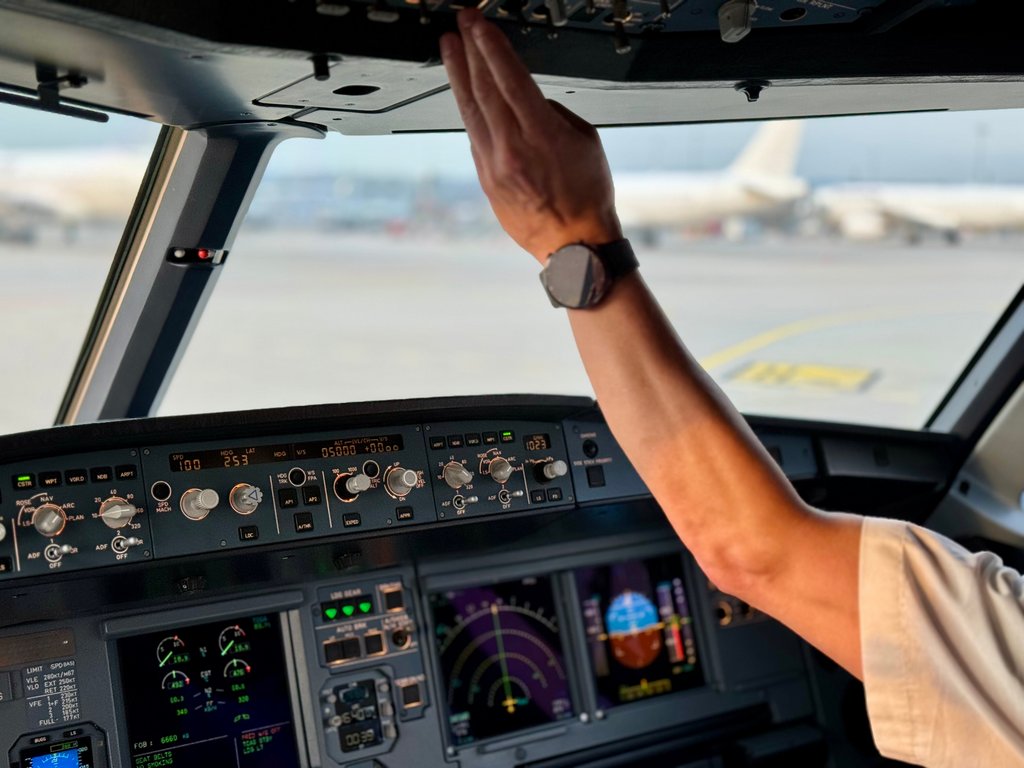Flight safety is a key issue in aviation that goes far beyond technical systems and modern aircraft. It requires continuous training, careful planning and constant monitoring. In this blog post, we take a look at the fascinating world of flight safety through the eyes of an expert: DC Aviation's Flight Safety Manager, Ronald Weber. In an in-depth interview, shares his experiences, insights and the innovative measures DC Aviation is taking to ensure the highest safety standards.
What made you decide to become a pilot and how did you become Flight Safety Manager at DC Aviation?
RW: I became Flight Safety Manager in 2008. The position was vacant and our flight operations manager at the time knew that I was very involved with aircraft accidents and had a lot of training experience. He approached me and I agreed.
My father was a glider pilot. So flying was part of my life more or less from birth. Nevertheless, I initially studied law and worked as a lawyer. Naturally, aviation law became one of my specialisations.
Dealing with aviation accidents automatically leads to aviation safety and training issues. Accidents can be avoided through good training, among other things.
I acquired various instructor licences and trained commercial pilots for many years. I also work as an instructor at DC Aviation. This is called TRI/TRE: Type Rating Instructor and Type Rating Examiner. As an instructor you are allowed to train, as an examiner you are also allowed to carry out checks. The big advantage for our pilots is that I know our flight operations and the associated special requirements very well. This allows me to offer my colleagues particularly effective training. A solid basis for safe flying.
DC Aviation goes above and beyond the legal requirements to ensure safe flight operations. What is one of the most innovative safety measures that the company has implemented?
RW: We fly according to Standard Operating Procedures (SOP), as is customary in scheduled flight operations. This means that more or less every action in the cockpit is defined. It is clear in all phases of the flight who presses which button or operates which lever and when. There is a clear division of labour. And not only during normal flight operations, but also when special situations arise, such as system failures. These SOPs are particularly helpful when things get stressful and we humans eventually reach a point where we can no longer function properly, where our ability to think is significantly impaired. If we have calmly thought about and determined in advance how to act sensibly in the event of an emergency, this leads to a significant increase in safety.
Regular training plays an important role in flight safety. What was the most exciting training you have ever completed?
RW: I had the privilege of attending a course a few years ago, which was partly about leadership behavior for instructors and partly about evaluation and assessment. An experienced flight captain and an aviation psychologist led this course. That was exciting.
My training to become a type rating instructor was also exciting, which took place partly in the simulator, but also on the aircraft. We used the aircraft to simulate an emergency descent, among other things. This is a maneuver that has to be flown after a loss of pressure in order to descend as quickly as possible from the cruising altitude to an altitude where you can survive without a pressurized cabin, because we can't survive at around -55°C at an altitude of 10,000m. We have to get down there quickly. This is a very unusual flight maneuver that most of our colleagues only know from the simulator. Engine failures were also simulated on the aircraft. Everything was much more exciting and instructive than in the simulator.
Safety is a constant process. As a pilot and flight safety officer, how do you keep up to date with safety protocols and procedures?
RW: There are various portals where you can log in and be informed about the latest changes. I'm also constantly checking the websites of various accident investigation authorities to see if there are any lessons to be learned from incidents. I also receive safety-related reports from our employees and, together with other committees, I am constantly asking myself where we can improve.
How important is teamwork between cockpit and ground personnel for safe flight operations?
RW: Very important! We organise CRM training once a year. It's all about good teamwork and good communication. CRM used to stand for Cockpit Crew Resource Management, but today it's called Crew Resource Management because it's not just about the cockpit, but also about the cabin crew and employees on the ground. From a very progressive point of view, we speak of Company Resource Management. Company, because in the event of a problem during the flight, I can phone our technical department from the cockpit and discuss the problem, to name just one example. Ultimately, the aim is to maximise safety by involving all available resources with good communication.
What personal experiences have shaped your understanding and appreciation of safety in aviation?
RW: Few accidents happen in aviation, but when something does happen, it usually has serious consequences. I have lost two friends in aviation accidents. I've also seen four crashes with my own eyes. That's something completely different to just reading about it. You have to do everything you can to prevent accidents.
Finally: What would you say to people who know little about aviation safety or perhaps don't appreciate it enough?
RW: Don't be fooled by the figures. If in the end it says that there were 0 accidents, that doesn't mean that everything was safe. Maybe it was just luck! Safety means more than just having been lucky. It means good training, careful selection of personnel, good training, good technique and well-considered and thought-out procedures, to name just a few points.
Yes, safety costs a little more. However, it makes more sense to buy safety than just luck. It is worth it!
Flight safety is the result of careful planning, rigorous training and continuous improvement. Our interview with Ronald Weber shows how important it is to learn from experience and react proactively to potential dangers. With innovative measures and a strong team that works seamlessly together, DC Aviation is setting new standards in flight safety. Ultimately, it shows that safety is more than the absence of accidents - it is the result of knowledge, preparation and the relentless pursuit of excellence.




